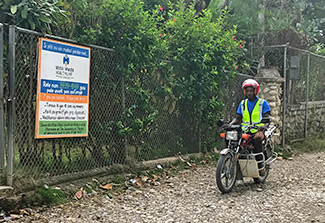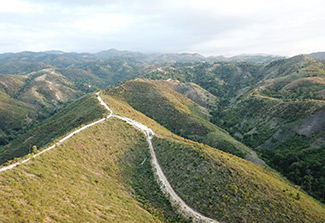Delivering hope and health care in Haiti and Ghana
May/June 2023 | Volume 22 Number 3
 Photo courtesy of MotoMedsA MotoMeds driver outside of the call center in Gressier, Haiti. Drivers are a critical resource with their "very granular sense of the existing road networks, they can navigate without maps or GPS to get to patients."
Photo courtesy of MotoMedsA MotoMeds driver outside of the call center in Gressier, Haiti. Drivers are a critical resource with their "very granular sense of the existing road networks, they can navigate without maps or GPS to get to patients."
By Mariah Felipe
When he first volunteered in Haiti during the 2010 cholera outbreak, Dr. Eric Nelson noted that his team was seeing more and more patients with avoidable dehydration whose symptoms had worsened during the overnight hours when access to medical care was unavailable. Haunted by this, Nelson,
a former Fogarty Fellow who studied cholera transmission in Bangladesh, shifted his studies after completing his residency at Stanford. He moved away from the research bench towards new disciplines that allowed him to learn new approaches to addressing the logistical challenges of expanding health care access.
In 2014, an NIH Early Independence award enabled him to delve deeper into implementation science research, ultimately leading to the creation of MotoMeds—a pediatric telemedicine and medication delivery service designed to prevent emergent illnesses from transitioning into emergencies.
Supported by Nelson's lab at the University of Florida, MotoMeds serves children 10 and under in Haiti exclusively during nighttime hours when families and patients are most isolated and children's conditions can deteriorate rapidly. From 6 p.m. every evening to 5 a.m. the following day, a call center is staffed by nurses and nurse practitioners who answer the calls of concerned parents and caretakers, with pools of motorcycle drivers on standb to transport medications or nurses. On-call physicians provide oversight for complicated cases or cases outside of the guidelines.
All of this is possible due to partnerships with the local communities and NGOs in the region that assist with needs like communication services and hiring qualified health professionals and drivers from within the country. By doing this, MotoMeds has created a mechanism to help the communities they serve while providing employment opportunities. "These opportunities enable the staff to provide for their family's needs and grow professionally," said Nelson, highlighting that many of the nurses were able to pursue nurse practitioner training through their engagement with MotoMeds.
 Photo courtesy of MotoMedsA mountainous region where MotoMeds operates in Gressier, Haiti.
Photo courtesy of MotoMedsA mountainous region where MotoMeds operates in Gressier, Haiti.
The drivers are another critical resource according to Molly Klarman, Project Director for MotoMeds Haiti. "Their granular sense of the existing road networks allows them to navigate without maps or GPS, or a formal address system, using landmarks to get to patients." Furthermore, the drivers often assist in treating mild cases by sharing video tutorials on a tablet, illustrating how to correctly prepare and take the medication—an additional step MotoMeds hopes will improve treatment adherence for patients.
While MotoMeds has specific metrics and benchmarks they use to measure progress, like getting to a household in under two hours or looking at the rates of guideline adherence, Nelson says, "There is a more human aspect to the program which comes through in our qualitative research."
MotoMeds surveys families, drivers, nurses, and doctors to get their feedback and help characterize the impact from a more human perspective. So far, they have found that one of the most important things MotoMeds has provided the community is hope.
"These are populations where no one has ever answered their call for help and MotoMeds is doing that," said Nelson. "Often, the families cry when we pick up the phone and talk with them. To me, that is a sign of a tremendous release of emotion. Hope is really the single most important thing that we deliver."
Despite having expanded twice—once to Les Cayes, Haiti, following the 2021 earthquake, and now in Ghana with the support of USAID and the National Ambulance Service—MotoMeds continues to face challenges in resource-limited settings. Nelson believes "digitizing guidelines so people can be trained more accessibly, establishing strong community partnerships, and employing effective clinical decision support software are essential ingredients for the nationalization of MotoMeds in countries like Haiti and Ghana," which is his long-term goal for the program.
MotoMeds hopes to establish an NGO to oversee its future operations and partner with other countries confronted by health care access challenges. The idea is that the program would be adaptable to the needs and preferences of partner countries while maintaining a research infrastructure, similar to the current setup in Haiti. Nelson stressed, "We want the operations to be fully managed by the partner country, with our support, and position the research in an equitable way."
Updated June 14, 2023
To view Adobe PDF files,
download current, free accessible plug-ins from Adobe's website.
Related Fogarty Programs
Related World Regions / Countries
Related Global Health Research Topics